JAPANESE MAJOR LEAGUE PLAYERS
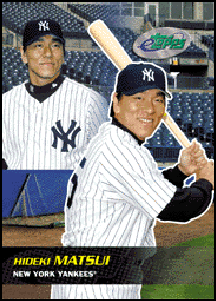
Matsui baseball card Many players from Japan's professional league have signed as free agents with Major League teams to play in the United States. Nomo Hideo, a former star pitcher of the Kintetsu Buffaloes, joined the Los Angeles Dodgers in 1995. Nomo was nicknamed “Tornado? for his unique delivery and voted the National League Rookie of the Year. Subsequently, other Japanese professional baseball players have flourished in the Major Leagues, including Ichiro of the Seattle Mariners, Matsui Hideki of the New York Yankees (2003-2009), Los Angeles Angels of Anaheim (2010), and Oakland Athletics (starting in 2011), and Matsuzaka Daisuke of the Boston Red Sox. Recently some young high school or college graduates have been scouted directly by American teams. Elsewhere, the Japanese national team has won consecutive championships at the 2006 and 2009 World Baseball Classic, an international baseball competition.
There are two ways a Japanese player can enter the Major Leagues: 1) by waiting for nine years until he becomes a free agent; or 2) by asking his home club to be "posted," which means he is auctioned off to the highest bidder with the home team pocketing the money. The latter is somewhat like the transfer fee system in European soccer.
Japanese baseball expert Robert Whiting told the Washington Post, “The really good players in Japan all want to go to the major leagues because of the money, the prestige and all the hassles of playing in Japan. In Japan, you have to carry your own bags, travel by train and stay in second class hotels. You also have to put up sometimes with abusive coach and excessive practices.”
In 2010, 12 Japanese players returned home for another go in the domestic leagues after experiencing the American Major Leagues. Several of them are thought to have managerial aspirations. The next trend may be the implementation of American ideas by Japanese managers who learned them as players in America.
Also see Japanese Major League Pitchers, Separate Article
Good Websites and Sources: Japanese Ball Players japaneseballplayers.com/en ; Baseball Reference (Do a Search) baseball-reference.com ; Successes and Failures seattle.mariners.mlb.com ; Hideki Matsui on mlb.com mlb.mlb.com/team/player ; Hideki Matsui Baseball Museum hideki.co.jp/top/english ; New York Times on Matsui’s Exit to the Angels nytimes.com ; Matsui, World Series MVP nytimes.com
Articles on Japanese Baseball: Negative Impact of Japanese Success in the Major Leagues time.com/time/world/ ; World Baseball Classic worldbaseballclassic.com ; Early Days of Japanese Baseball international-baseball.suite101.com ; New York Times article om Japanese Fans travel.nytimes.com ; Baseball Hall of Fame Timeline on History of Japanese Baseball english.baseball-museum.or.jp ; Academic Paper on Japanese Baseball /www.economics.hawaii.edu
Links in this Website: SPORTS IN JAPAN (Click Sports, Recreation, Pets ) Factsanddetails.com/Japan ; JAPANESE BASEBALL Factsanddetails.com/Japan ; JAPANESE BASEBALL RULES, CUSTOMS AND FANS Factsanddetails.com/Japan ; JAPANESE BASEBALL TEAMS Factsanddetails.com/Japan ; JAPANESE BASEBALL PLAYERS Factsanddetails.com/Japan ; JAPANESE MAJOR LEAGUE PLAYERS Factsanddetails.com/Japan ; JAPANESE MAJOR LEAGUE PITCHERS Factsanddetails.com/Japan ; ICHIRO SUZUKI Factsanddetails.com/Japan
First Japanese Player in the United States
The first Japanese player to play in the Major Leagues was a left-handed reliever named Masonori Murakami, who was called out of San Francisco bullpen in the eight inning of a games against the New York Mets on September 1, 1964. "As I walked to the mound," he recalled, "I tried not to get to nervous, so I hummed the song Sukiyaki, which was very poplar in the states at the time...The day before I was playing in Fresno with 200-300 people. The next day I was played in New York for 40,000 people."
Murakami was signed out of high school to play for the Nakai Hawks. In 1964, after a year spent mostly in the Japanese minors he was dispatched to play in the U.S. for the Single-A minor league team Fresno Giants. Later he told Jim Allen of the Daily Yomiuri, “I never thought about playing the majors. I was just enjoying playing minor league ball.” While playing in Fresno the San Francisco Giants purchased an option on him for $10,000.
Murakami said, “On August 29th the manager Bill Werle said, “Mashi, your’re going to go up to the majors.” On the 30th the Fresno owner handed me a United Airline ticket from Fresno to San Francisco to Kennedy Airport and gave me the address of the Roosevelt Hotel in New York.” Murakami said he expected someone to meet him at the airport but no one was there. No one had heard of him at the hotel either but he was eventually able to find a room but was too afraid to go out on the streets of New York and ate at the hotel restaurant.
Murakami pitched in nine games, striking out 15 batter in 15 innings in 1964. He returned to the Giants the next season and went 4-1, with eight saves and a 3.76 ERA and 85 strikeouts in 74 innings. He returned to Japan in 1966, citing “giri” ( “obligation “) and “ninjo” ( “humanity “). After his departure it would take 30 years before another Japanese player would play in the Major League.
The first Japanese to play as a professional ball in the United States was Goro Mikami, an infielder known by the name of “Jap Mikado.” In 1914 and 1915, he played for a barnstorming team called the All Nations, so called because its players were a mix of Mexican, Cubans, African Americans and Native Americans. They toured the United States and played local teams in a fashion not unlike that of the Harlem Globetrotters.
Japanese Players in the Major Leagues
Through the 2011 season, 38 Japan-born pitchers had appeared in the major leagues. There were nine in 2011.
In 2012 the Mariners and Rangers had three Japanese players each. The Mariners had Ichiro Suzuki, pitcher Hisashi Iwakuma and second base Munenori Kawasaki. The Rangers had the pitchers Yu Darvish, Yoshinori Tateyama and Koji Uehara. In 2011, Tateyama and Uehara played in the division series in 2011 but were left off the Texas Rangers World Series roster.
On Japanese players in the Major Leagues, Ichiro told AP, "You look at other countries, Venezuela and the Dominican Republic, they have a lot of stars that perform at this level, and when you compare Japan to those countries, we're not there yet. That's what I look forward to saying in the future.'' On Muneroni Kawasaki’s constant shouting, Seattle Mariners’ Brendan Ryan said, “I don’t know if they’re softball chants or, “We want a hot dog, we want a coke,” stuff?
As of 2008, 32 Japanese players had played in the Major League with 15 of them playing in 2008. By some estimates there about 50 players in Japan that are good enough to play in the Majors. Japan had 11 players in the Major League in 2004. Some Japanese players have hit better in the Major Leagues than they did in Japan. Hideki Matsui, Daisuke Matsuzaka and Ichiro Suzuki vie with each other for the top spot as Japan’s favorite athlete.
Tsuyoshi Shinjo
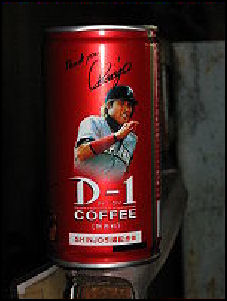
Shinjo on a coffee can Tsuyoshi Shinjo, a former player with the Hanshin Tigers, found some success in the Major League in 2001. He played well with the New York Mets. His statistic were not all that great but he came through with some key plays at important times and was liked for his easy-going, idiosyncratic and funny style and his garish taste in clothes.
Shinjo played for ten years with Hanshin. He had a 249 career average and 145 home runs. Known in Japan as “Uchujin” ("Spaceman"), hHe turned down a $12 million, 5-year offer from Hanshin and joined the Mets as a free agents for the Major League minimum salary of $400,000 for one year.
Shinjo was initially assigned as the Mets' forth outfielder but began playing every day after the other outfielders were forced out because of injuries. He did pretty well for a first year player in the Major league. He hit .267 with 10 home runs and 56 RBIs in 123 games. He played center, right and left field, and lead the Major League rookies with 12 assists. Shinjo reveled in all the attention and made himself more available to the media and fans than Ichiro or Nomo and had a good time doing it.
In the off season Shinjo was traded to the San Francisco Giants. In 2002, he became the first Japanese player to appear in a World Series and the first Japanese player to get a hit a in the World Series. In 2004, he returned to the Japan League and played for Nippon Ham Fighters. His main claim to fame that year was stealing home to get the go ahead run for the Pacific league in the Japan All-Star game. Shinjo retired after the 2006 season.
Kenji Jojima
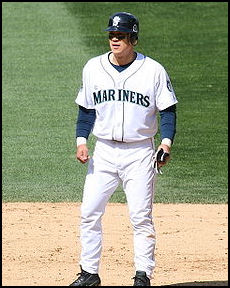
Kenji Jojima was a hard-hitting catcher who played for the Seattle Mariners from 2006 to 2009 and finished his career with the for the Hanshin Tigers. Jiji Press reported: Jojima was the top draft pick of the Fukuoka Daiei Hawks, now the Fukuoka SoftBank Hawks, in 1995. A slugger and catcher with a strong arm, Jojima helped the Hawks win the Pacific League title three times and the Japan Series championship twice. In 2003, he was named MVP of the Pacific League. Jojima exercised his free agency rights and signed with the Seattle Mariners in 2006, becoming the first Japanese catcher ever to play in the major leagues. After four seasons, he joined the Tigers in 2010. ver a total of 14 seasons in Japan, Jojima played 1,323 games, hitting .296 with 244 home runs and 808 RBIs. In the 462 appearances he made for the Mariners, he batted .268 with 48 homers and 198 RBIs. [Source: Jiji Press, September 29, 2012]
Kenji Jojima began his Major League career as the catcher for Seattle Mariners in April 2006. He was given a three-year $16.5 million deal. He homered in his Major League debut. During his first spring training one of his Seattle team mates, taking advantage of Jojima’s limited English asked him to deliver a message to the couch—“F — -- Off!” — Jojima delivered the message. The coach was initially shocked but everybody laughed including Jojima. His team mates also gave him a shock-emitted lighter and tied the laces of his shoes together, all of which Jojima endured with good cheer.
Jojima played for 11 season in the Japan League withe Fukuoka Softbank Hawks. He averaged 30 homers, 87 RBIs and had a .305 average in his last five Japanese seasons. He won the Japanese Gold Glove seven times and was a Pacific League MVP. In his last season in Japan he hit .309 and had 24 homers and 57 RBIs in a season shortened by a broken leg,
Jojima was a friendly and energetic presence for the Mariners. He often shouted encouragements. There were some doubts that he would handle communication between the catcher and pitcher. But those doubts were soon silenced. He proved to be tough at the plate, and held his ground against hard charging sluggers trying to knock him off plate. In one memorable play he took a throw from Ichiro on the fly from right field and held his ground against a big Major League layer and did a backward somersault but held on to the ball and get the player out.
In April 2008, Jojima singed a three-year $24 million contract extensions with the Mariners through 2011. He struggled in 2008. In 2009, he missed a couple of weeks after breaking his toe in a collision at home plate.
In the 2010 season Jojima returned to Japan and played with Hanshin Tigers. Upset that he was benched much of the 2009 season in favor of rookie Rob Johnson, he opted out of the last two years of his contract with Mariners without accepting any compensation for the time he missed. A year earlier he signed a three-year $33 million contract with the Mariners that would have paid him $7.7 million for 2010 and $8.1 million for 2011.
Jojima He retired at the end of the 2011-2012 season, with one year left on his four-year contract with the Tigers, citing a series of injuries to his left knee and right elbow sharply dented his performances over the past two years. "Because I'm a catcher, I've been able to play for 18 years, including in the United States," Jojima said during a news conference at Koshien Stadium. "The injury I have now is too big a hurdle for me to overcome. I've reached my limit as a catcher." [Source: Jiji Press, September 29, 2012]
Tadahito Iguchi and So Taguchi
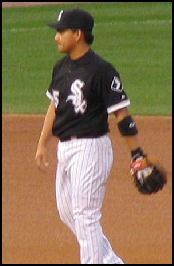
Iguchi In 2005, Tadahito Iguchi of the Chicago White Sox became the first Japanese player to play on a World-Series-winning team. Iguchi hit .278 for the season with 15 home runs and 71 RBI and was a solid 2nd basemen. His hitting in the World Series was not so great but had some crucial hits in the playoffs. His three run homer against the Red Sox gave the White Sox a 5-4 victory and allowed them to advance to the World Series. He batted just .167 in the series and .191 during the post season.
Iguchi played the Fukuoka Softbank Hawks in Japan and batted .333 and had 24 home runs in his last season with the Hawks. Iguchi was traded to the Philadelphia Phillies in the middle of the 2007. He was traded to the San Diego Padres for the 2008 season, with whom he signed to a one year, $3.85 million contract.
Tadahito Iguchi began the 2008 season with the San Diego Padres but was released after suffering a shoulder injury in June and then moved late in the season to the World Series champions Philadelphia Phillies but hardly played with them and was ineligible for the World Series. He batted .232 with two home runes and 24 RBIs in 85 games with both teams. In 2009, Iguchi returned to Japan, playing for the Lotte Marines under a three $1.8 million-a year contract.
Taguchi played for two World Series winning teams: the Cardinals in 2006 and the Phillies in 2008. In 2006, So Taguchi became the second Japanese player to be on a World Series winning team. His team, the St. Louis Cardinals, defeated Detroit Tigers in five games. Taguchi was used mostly as pinch hitter and late inning substitute but came up with some key hots and kept times. He scored the go-ahead run in the final game of the World Series, hit a solo home runs in the National League division championship and a tie-breaking solo home run in the ninth in Game 2 of the National League Championship series,.
In the World Series he was 2-for-11 with four runs scored. In post season play he got off to great start, hitting two home runs — as many as he hit during the entire regular season — in his first two at bats. Overall in the post-season he batted .400 and had two homes and four RBIs. It was 37-year-old Taguchi’s fifth year with the Cardinals,
Taguchi played six seasons with the St, Louis Cardinals, starting in 2002 when he signed a free agent deal. he played with the Orix Blue Wave in Japan. In 2008, at the age of 39, he played with the Philadelphia Phillies with whom he had signed a one-year, $900,000 contract. The Phillies won the World Series but he hardly played.
After nine years in the Majors Taguchi returned to Japan in 2010 to play with his former team, the Orix Buffalos. He was on the Orix Blue Wave team with Ichiro when the team won the Japan Series in 1996.
Akinori Iwamura
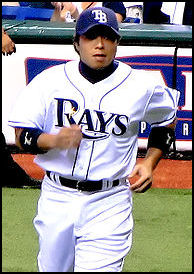
Akinori Iwamura played three seasons for the Tampa Bay Rays, who acquired him ahead of the 2007 season through the posting system. A winner of six Central League Golden Glove Awards at third base, Iwamura became the Rays' second baseman in 2008, the year they won the American League pennant. He finished his big league career in 2010 with the Pittsburgh Pirates and Oakland Athletics. Iwamura batted .267 with a .345 on-base percentage and 16 homers over four major league seasons.
In 2006, Akinori Iwamura signed a $7.7 million, 3-year contract with the Tampa Bay Devil Rays. The Rays paid $4.5 million for the right to negotiate with him. Iwamura was a five-time Central League all-star and six-time Gold Glove 3rd basemen with the Yakult Swallows. He hit .300, with 188 home runs and had 570 RBIs in nine seasons with Yakult. He had at least 30 homers in last three years in the Japan League with career high of 44 in 2004. He batted .311 with 32 homers and 77 RBIs in the 2006 season with Yakult
Iwamura got off to good start with the Tampa Bay in 2007 and then got injured. At 29 he was one of the older players on a very young team that finished last. In 2008 Iwamura played very consistently and played a key role in the Devil Ray’s transformation from American League East’s worst team, finishing last in the division most of the previous ten years, to division leader edging out the Red Sox and finishing eight games ahead of the Yankees.
In the post season Iwamura came through on AL championship series, with some key helps, that helped defeat the Chicago White Soc 3-1 but had a disappointing showing in the World Series.
In May 2009, Iwamura tore the anterior cruciate ligament on his left knee while trying to turn a double play when an opposing player slid into him. It was originally thought he would miss the entire season but the injury was not as bad as previously though and the knee surgery was successful. Iwamura a was batting 310 at the time of the injury, which left him writhing on the grass in pain and required him to be carried off the field in a stretcher. Iwamura said, This is the most painful moment I’ve ever had in the United States, Obviously it hurt when the guy hit me.” Iwamura returned in August.
Before the 2009-2010 season Iwamura was traded to the Pittsburgh Pirates. With the Rays he batted .281 with 14 homers, 194 RBIs and 29 stolen in three seasons: one at third base and two at second base.
The Pirates dumped Iwamura to make room for a new prospect, The noticeably chubby infielder hit only .182 with two home runs and nine RBIs in 54 games in 2010. He was relegated to the bench after a 0-34 slump. At the end of the season he was picked up by the Oakland Athletics and said he was grateful to be playing for them and happy to be back in the big leagues.
Iwamura joined Rakuten in Japan in 2011. The Eagles signed Iwamura to a two-year deal worth ¥300 million plus performance-based incentives, but the left-handed hitter batted just .190 with one homer and 14 RBIs in 103 games with the Eagles. "He accomplished so much before he went to the majors. I hope he can show some of that form next year," Swallows team president Tsuyoshi Kinugasa said. In December 2012, Kyodo reported: “The Yakult Swallows announced they have signed 33-year-old infielder Akinori Iwamura, who will return to the club for the first time since 2006. Iwamura, who suffered a calf injury in March and a thigh injury in September, was released following a season in which he batted .209 in 26 games for the Tohoku Rakuten Golden Eagles. Iwamura has 1,119 career hits and 189 homers in Japan after signing out of high school as the Swallows' second-round draft pick in 1996. [Source: Kyodo, December 12, 2012]
Kosuke Fukudome
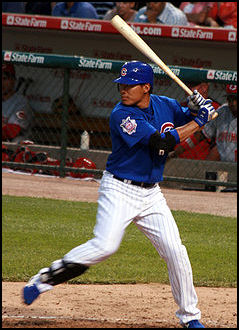
In December 2007, the Chicago Cubs signed 30-year-old Kosuke Fukudome to a four-year, $48 million contract. Fukudome spent nine season as an outfielder with the Chunichi Dragons, hitting 192 home runs and maintaining a batting average of .305. He was a hero at the inaugural World Baseball Classic in 2006, coming off the bench as a pinch hitter with a clutch home run and some clutch hits. (See World Baseball Classic).
Fukudome first made a name for himself on Japan’s silver-medal-winning team in the 1996 Atlanta Olympics and was selected the MVP of the Central league in 2006. That year he was the Central League’s batting champion and led the league in runs scored and hit a record 47 doubles. He had two batting titles and four Gold Gloves but was recovering from elbow surgery when the Dragons won their first league title in 53 years. Fukudome is known for having a good eye. He is usually selective about his pitches, His on-base percentage with the Dragons in his last three seasons, .442. .438 and .430, was top in the Central League
Fukudome got off to a good start, quickly becoming a fan favorite. In his Major League start, Fukudome went 3-for-3 with game-tying 3-run home run in the ninth but the Cubs lost. After a month of solid hitting fans cheered him every time he came to the plate and merchandise with his name and number were bestsellers. He was batting .336 and the Cubs were solidly in first place with other players playing well as well.
Fukudome made the National League All-Star team bur faded in the second half of the season. He hit only .217 after the All Star break (but came through with his 200th career home run in August) and was occasionally booed by Cubs fans and finished the season with a .257 average. The Cubs made the playoffs but they and Fukudome didn’t do very well. Fukudome was 0-8 in his first eight at bats, with four strikeouts. The Cubs lost the series in three straight games to the Dodgers and Fukudome only got one hit.
Fukudome made $12 million in 2010. He had a four-year, $48 million deal through 2011.
Early in the 2011 season Fukudome had his first five-for-five game, singling five times. Then feat happened when it was his birthday in Japan but because of the time difference it wasn’t his birthday yet in Chicago. At that stage about three weeks after the season began he was batting .478 but the Cubs were only 10-12.
In the middle of the 2011 season, Fukudome was traded from the Cubs to the Indians. Fukudome was hitting .279 with three homes and 13 RBIs in 98 games with the Cubs when he was traded. He had a career .369 on base percentage with the Cubs.
In July 2012, the Yankees signed Kosuke Fukudome to minor-league deal. He was assigned to Triple-A Scranton-Wilkes Barre. The White Sox signed Fukudome to a one-year, $1 million contract for the 2012 with a club option for 2013. He was an major disappointment, hitting just .171 in 24 games with Chicago.
Little Matsui
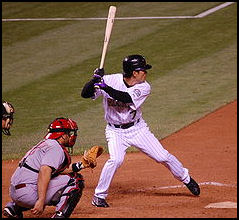
Kazuo Matsui, better known as “Little Matsui,” joined the New York Mets in 2004 when he was 28. He signed a three-year deal worth $20.1 million. He had previously played shortstop with the Seibu Lions and was Gold Glove four times and was Japanese all star seven times. In 1999, he was voted the Pacific League’s most valuable player. In 2003, he hit ,305, with 33 home runs and 84 RBI. He is a switch hitter and once hit home runs from both sides of the plate in an all star game.
Matsui was the lead off hitter and for the Mets and played second base. He had flashes of brilliance but made a lot of errors and hit many rally-ending grounders and routinely received boos from Mets fans. He spent much 2006 in the minors and over 2½ years with the Mets hit .256. In 2007 he was traded late in the season to the Colorado Rockies and helped turn that team around.
Matsui joined the Rockies when they were is last place after a hopeful 44-40 start and was immediately sent the to Minor Leagues. When he began playing with the team he provided a spark that turn the team. Batting mostly lead off, he hit .345 and stole eight bases in 32 games The Rockies ended up making the playoffs with a impressive string of wins at the end of the season that they carried into the playoff s and kept going until they were shut down in the World Series by the Red Sox. Matsui hit a key grand-slam homer in the play offs.
Kaz Matsui was with the Houston Astros in 2008, when he batted .293 with 26 doubles and 20 stolen bases but missed 65 games with various injuries, and 2009. In August 2009,he got his 2,000th career hit.
Kazuo Matsui was waved by the Houston Astros in May 2010. At the time he was batting .141 and had been hitless his last 20 at bats. He was in the last season of a $16.5 million contract. Matsui joined Rakuten in Japan in 2011.
Norichika Aoki
In 2012, Norichika Aoki played with Milwaukee Brewers. In January 2012, he was signed to a two-year contract. According to the Japan Times will make at least $2.25 million over two years under his contract and would earn up to $8,187,500 if his 2014 option is exercised and he has at least 140 starts and 150 games played per season. Aoki gets salaries of $1 million this year and $1.25 million in 2013. Milwaukee holds a $1.5 million option for 2014 with a $250,000 buyout. The Brewers won the rights to negotiate with Aoki with a $2.5 million posting bid. [Source: CBS Sports, January 17, 2012]
Aoki joined the Brewers from the Tokyo Yakult Swallows and, after starting the season on the bench, worked his way into the starting lineup. He appeared in 151 games, batting .288 with 10 home runs and 50 RBIs. He finished fifth in the voting for the National League Rookie of the Year. [Source: Jiji-Daily Yomiuri, November 15, 2012]
Aoki spent his entire professional career in Japan with the Yakult Swallows. He hit over .300 in six of his seven full seasons and was a three-time batting champion in Japan’s Central League. He was the league’s 2005 rookie of the year and is a six-time Gold-Glove award winner. Brewers manager Ron Roenicke said, “He’s a very good outfielder, defensive outfielder, with the Gold Gloves that he’s won. Obviously he’s won batting championships, so he can hit.” He bats left-handed, throws right-handed and can play all three outfield positions. [Source: AP, February 24, 2012]
The Brewers exploited Aoki’s versatility in the field and at the plate. “Because he runs well, because he can bunt, because he can hit, that allows us to be very flexible which is really good for him.” Roenicke said. “He should be able to get into more ballgames because of that.
Tsuyoshi Nishioka
Tsuyoshi Nishioka started at second base for the Minnesota Twins at the age of 26 in the 2011 season after signing a three-year, $9-million contract. The Twins won the right to sign him after bidding the most for him under Japanese posting system and paying his former team the Lotte Marines a $5.3 million posting fee. Nishioka is a switch hitter with speed. He was the batting champ in Japan in 2010 the same year the Marines won the 2011 Japan Series. The American press dubbed him “Ichiro Light.” Unfortunately his leg was fractured in a take out slide against the New York Yankees a few games after the season began. He showed up at home opener on crutches. After being placed on the 60-day disabled list he returned to the line-up in late June as shortstop.
In September 2012, Minnesota Twins infielder Tsuyoshi Nishioka was granted his unconditional release, making him a free agent. The Sports Xchange, reported: “Nishioka requested his release, absolving the Twins of their 2013 financial obligations, which included a $3 million salary or a $250,000 buyout. "I would like to thank the Twins organization for helping me fulfill my dream of playing in Major League Baseball," Nishioka said in a statement. "I take full responsibility for my performance which was below my own expectations. At this time, I have made the decision that it is time to part ways. I have no regrets and know that only through struggle can a person grow stronger. I appreciate all the support the team and the fans in Minnesota and Rochester have shown me. Arigatou gozaimasu [Thank you]." The 28-year-old batted .215 in 233 at-bats over two seasons. He spent most of the 2012 season at Triple-A Rochester. [Source: The Sports Xchange, September 28, 2012]
In February 2012, AP reported: “The rock star-like arrival preceded a disastrous first season in the United States for the middle infielder. Now all those cameras and reporters from his homeland are gone, off to cover bigger stories. If Nishioka doesn’t show major improvement from a rookie year in which he hit just .226 with five extra-base hits in 68 games for the Twins, he thinks he could be gone, too. [Source: AP, February 23, 2012]
Nishioka is in the second season of a three-year, $9.25 million deal he signed to come overseas after winning the batting title and a Gold Glove at shortstop in Japan in 2010. He wasn’t implying that he would hang it up if things didn’t go well; rather he was acknowledging that there is a lot riding on his second year in the U.S.
He was penciled in as the starting second baseman early in camp, but the transition, both culturally and athletically, proved to be a difficult one. Nishioka broke his left leg in the season-opening series in Toronto and never looked comfortable when he came back. “It was kind of my own decision to come to major league and challenge,” Nishioka said. “But definitely it was a tough season.”
A's Agree on $6.5m, 2-year Contract with Hiroyuki Nakajima
In December 2012, Josh Dubow of Associated Press wrote: Oakland Athletics general manager Billy Beane hopes he got another significant addition from the international market. The A's finalized a $6.5 million, two-year contract with Japanese shortstop Hiroyuki Nakajima. "There are some things when you're here in Oakland that just feel right. This one felt right," Beane said. "The longer we went on, the more information we got we said let's take a chance on the unknown as opposed to going down the road of the known." This marks the second straight offseason that Beane has added a prominent international player, with the team having signed Cuban defector Yoenis Cespedes to a $36 million, four-year deal last winter. Beane said there is much more information available about foreign players, making signing them less risky. [Source: Josh Dubow, Associated Press, December 18, 2012]
Nakajima, 30, is an eight-time All-Star in Japan and a three-time Gold Glove winner. He has a .302 career batting average with 162 homers in 11 seasons with the Pacific League's Seibu Lions. He has hit 20 or more homers in a season four times. He batted .311 with 29 doubles, 13 homers and 74 RBIs in 136 games for the Lions last season. The A's have had interest in Nakajima for a few years and made their move to fill their most glaring hole. "The more things we uncovered the longer we got into the winter, the more we realized this was the guy," Beane said. "We were a little concerned early on the competition might make it challenging for us financially. But as pieces started laying down with other clubs and positions were filled, I think that helped us.”
Nakajima also has extensive international experience, having participated in both the 2008 Olympics and 2009 World Baseball Classic for Japan. He said he will not play in the upcoming WBC. Beane said the A's also got strong reports on Nakajima's personality and his ability to fit into a major league clubhouse. Those skills were evident at his opening news conference that Nakajima began with a rehearsed opening statement in English that he said he spent all night preparing.
"Hi Oakland," he began. "My name is Hiroyuki Nakajima but you can call me Hero. I'm honored to be here today and very thankful for everyone coming today. Thank you very much Mr. Beane." Later in Japanese, Nakajima said through an interpreter that Beane was "extremely sexy and cool," one of his biggest adjustments will be the lack of bathtubs in the United State and said he wanted to learn the "Bernie Lean" dance that was so popular in Oakland last season.
Nakajima will get a $1.25 million signing bonus and base salaries of $2.25 million next year and $2.5 million in 2014. He can earn up to $1.3 million in performance bonuses next season. Whatever bonuses he earns will be added to his salary in 2014, when he can earn up to $600,000 in bonuses based on playing time. Nakajima could earn as much as $9.2 million his first two years. There is also a $500,000 buyout if the A's don't exercise their option for 2015, and Nakajima will be eligible for free agency at the end of the deal. The contract also includes awards bonuses and various perks including an interpreter, flights to and from Japan and moving expenses.
Nakajima nearly came over to the majors last offseason after the New York Yankees bid $2.5 million for his rights. But Nakajima wanted to play every day so went to the Lions for one more season before becoming a free agent this winter. "I'm very grateful having made that decision," he said through an interpreter. "To be wearing an A's uniform right now, I'm just very excited.”
Hiroyuki Nakajima Unable to Strike a Deal with the Yankees
The New York Yankees negotiated with Seibu Lions shortstop Hiroyuki Nakajima to make him a player but were unable to reach an agreement. Nakajima is a four-time Pacific League All-Star with a .302 career batting average over 10 seasons, all with the Lions. He appeared in all 144 regular-season games in 2011, batting .297 with 16 home runs, 100 RBIs and 21 stolen bases.
Kyodo reported: “The New York Yankees said that their negotiations with Japanese shortstop Hiroyuki Nakajima have ended without a contract. "We unfortunately could not come to an agreement with Hiroyuki," Yankees general manager Brian Cashman said in a statement issued by the team. "We wish him the best of luck during the upcoming 2012 season." [Source: Kyodo, January 6, 2011]
Under the rules of the posting system, the Yankees' modest winning bid of $2.5 million will be refunded since no deal was struck and Nakajima will return to the Seibu Lions. "It's disappointing we couldn't work something out," Nakajima said. "But I'm grateful to the Lions for posting me and the Yankees for bidding."
One Pacific Rim, major league scout said Nakajima's chances of signing with the Yankees were likely hurt by the dismal season that Minnesota Twins infielder Tsuyoshi Nishioka had in 2011. Nishioka was posted by the Lotte Marines last winter and joined the Twins as the PL batting champion for the Japan Series champions, but finished his first year in Minnesota with a .226 average and just two stolen bases in 68 games. Only five of his 50 hits went for extra bases, all doubles. "I think Nishioka's poor season affected the appraisal of all Japanese infielders," the scout said. Also, Nakajima made 280 million yen (about $3.3 million) with Seibu last season, a salary the Yankees, who are actually trying to keep their payroll down, likely did not match for a player they wanted as a backup for the likes of Derek Jeter, Alex Rodriguez and Robinson Cano.
Image Sources: 1) 5) 8) Japan Zone, 2) Matsui, 3) Japan-Photo.de file sharing 4) 6) 7) 9) 10) 11) 12) 13) Wikipedia
Text Sources: New York Times, Washington Post, Los Angeles Times, Daily Yomiuri, Times of London, Japan National Tourist Organization (JNTO), National Geographic, The New Yorker, Time, Newsweek, Reuters, AP, Lonely Planet Guides, Compton’s Encyclopedia and various books and other publications.
Last updated January 2013
